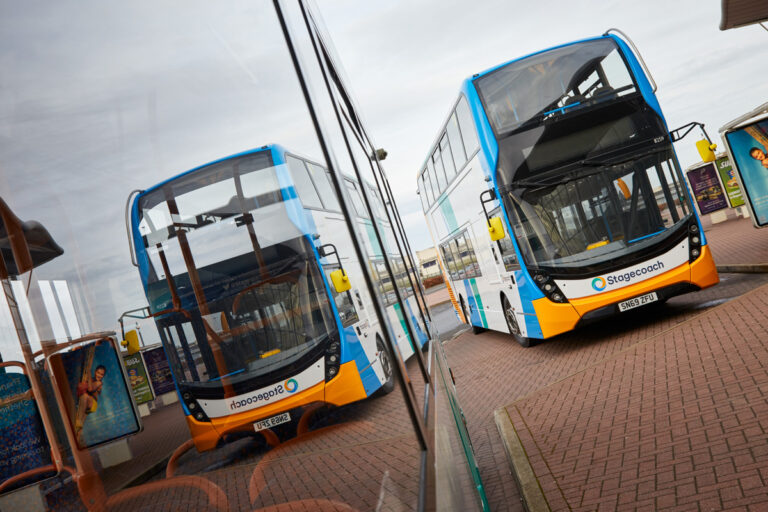Stagecoach chief executive Martin Griffiths outlines out a six-point plan for the ‘new normal’ during Covid-19, identifying the key role of public transport and the short- and long-term changes that he believes will help reboot Britain’s economy and protect communities.
Covid-19 has taken a terrible toll on many people’s lives across the UK and overseas. The pain has also been deeply felt in the transport sector and our hearts go out to the colleagues and families of those we have lost. Like our incredible health and care workers, these heroes behind the wheel have made and still make an immense contribution to the fight against the virus.
But among all the human tragedy, the pandemic has given us a window on what could be a positive future world – one with dramatically fewer cars on our roads, safer streets, cleaner air and less damage to our environment. As government examines how to take Britain out of lockdown, we must make Covid-19 a defining moment to deliver fundamental changes in how we manage mobility and put sustainability at the heart of decision-making. Public transport – particularly our regional bus networks – and active travel must be central to a transformed approach by all governments.
The lockdown has shown how much the country is missing human contact. Buses provide that essential daily social link, helping combat loneliness and hidden mental health challenges. While some have switched to home working during Covid-19, for many that is not possible. Buses are delivering vital emergency links for key workers and they are as critical to our economy in normal times, linking everything from retail centres to manufacturing facilities. Leisure too is a shared experience that depends on extensive public transport connections.

But public transport faces a challenge as we contemplate the new ‘normal’. Research by consultants SYSTRA suggests public transport use in Britain’s cities could be 20% lower than pre-Covid-19 levels after lockdown. I believe we need a bold six-point plan and a joint strategy with government both now for the short-term transition and to put in place key policy changes for the long term.
Firstly, securing our transport future must start with industry and government developing a joint operational and investment plan. We must ensure a sustainable transition of Britain’s bus networks from the emergency levels of lockdown to more comprehensive links that support the country’s recovery. This could include a move away from peak-time commuting to spread demand. We will need to rebuild confidence in mass transit in the months ahead and provide phased support for it to be sustainable. Building on measures already introduced by operators to protect transport workers and customers, there is no reason why we all cannot return to safely using Britain’s most important public transport mode. Transitional support is an investment that will pay back many times over in helping our citizens, communities, economies and planet recover.
Secondly, the post Covid-19 strategy needs national and local government to introduce radical, permanent changes to our approach to infrastructure and planning, including the crucial first and last mile. Road space is key. Some cities have already drawn up plans to reconfigure street layouts with more space for cycling and walking. We also need to prioritise high capacity buses over restricted capacity cars on the limited road space available. Public mobility hubs rather than private car parking spaces should be requirements for planning new housing developments, offering public transport connectivity, electric charging points and cycling.
Public transport remains central to future levelling up of regions outside London, with many hit hard by the economic shock of Covid-19. Towns and cities must develop new place strategies to re-imagine their high streets and wider offer. With more major retailers failing, we need to foster innovative independents, encourage people to shop local and create new attractions. Only public transport has the capacity to bring these shoppers and visitors to our regions on a scale that will not damage their environment.
In the wake of Covid-19, our country will rightly examine the value we place on health and our National Health Service. We have known for years about the damaging impact of transport emissions, mostly from cars, on our country’s health. Now pollution, already responsible for asthma and lung disease, is also being linked as a contributor to Covid-19 deaths. Many single-user car trips – the transport equivalent of disposable plastic bags – can be easily replaced by public transport in urban locations. We must change our behaviour and mind-set, not just the technology we use.
Chancellor Rishi Sunak has already hinted at a post-Covid-19 re-examination of fiscal policy. There will be a huge price to pay for the pandemic and the necessary actions our country has taken. Where that burden falls will be a major political debate – and we will all have to pay a share in varying degrees. Crucially, that grown-up conversation needs to include a complete transformation in how transport journeys are taxed. We need a system where the polluter pays and we reward sustainable behaviours and use of buses, trams and trains, as well as active travel, making these modes more affordable and accessible to all.
Finally, while public spending will have to be tightened in many areas, Covid-19 shows there is an even more powerful case for targeted investment in sustainable transport and infrastructure. It can help restart the economy, put Britain at the forefront of the green revolution and speed up the tough journey ahead to recovery. Even with the record annual drop in carbon emissions and pollution as a result of lockdowns, our world is not even close to achieving the targets necessary to save our planet. Investing in decarbonisation is more important than ever. Here we can maximise the potential of Britain’s world class and world-leading bus manufacturing sector. Accelerated and increased government investment in electric bus fleets will deliver a cleaner environment, improved health and cement Britain’s position as a clean-tech leader.
Major events can lead to major change. The 9/11 attacks in 2001 signalled a new approach to security and global co-operation against terrorism. We need to make Covid-19 the game-changer for sustainable transport and out of tragedy create hope. By grasping this opportunity and working together, we can create a real legacy to honour the key workers that have selflessly given their lives in the fight against coronavirus.





